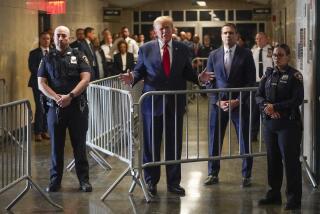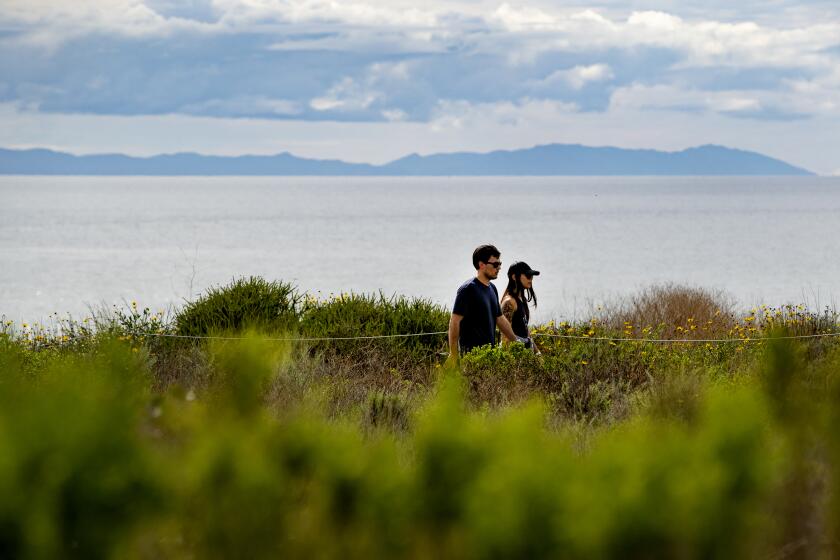Opinion: So what do we mean by ‘collusion’ anyway?

After the indictments of his former campaign chairman and deputy chairman were announced Monday morning, President Trump took to Twitter to tut-tut that “this is years ago, before Paul Manafort was part of the Trump campaign.” (Actually, some of the alleged wrongdoing took place in 2016.) Then three minutes later came this addendum: “....Also, there is NO COLLUSION!”
But that tweet didn’t seem to reckon with special counsel Robert S. Mueller III’s second bombshell of the day: the announcement of the guilty plea by Trump campaign advisor George Papadopoulos — or, as Trump referred to him in a tweet on Tuesday, “the young, low level volunteer named George.”
Papadopoulos pleaded guilty to lying to the FBI about contacts with a London-based professor he believed to have “substantial connections to high-level Russian government officials” and who told Papadopoulos last April that the Russians had “dirt” on Hillary Clinton and “thousands of emails.”
To a lot of people, Papadopoulos’ seeming openness to Russian overtures sounds like collusion. But not to Trump. He continues to maintain, as he tweeted last week, that “there was NO collusion between Russia and Trump. Was collusion with HC!”
On Monday, White House Press Secretary Sarah Huckabee Sanders elaborated on the latter claim, a variation of Trump’s famous Pee Wee Herman-like response in a televised debate to Clinton’s suggestion that he was Vladimir Putin’s puppet. “No puppet,” Trump shot back. “You’re the puppet!”
The Clinton collusion claim hangs (precariously) on the fact that the Clinton campaign and the Democratic National Committee, acting through a law firm, paid a consulting company named Fusion GPS to do opposition research on Trump. Fusion GPS in turn hired a retired British intelligence officer named Christopher Steele, who compiled the now-infamous “dossier” about Trump’s alleged compromising contacts with Russia.
As Sanders put it on Monday: “There is clear evidence of the Clinton campaign colluding with Russian intelligence to spread disinformation and smear the president to influence the election.”
Actually there isn’t. But one can argue that the Clinton campaign might have inadvertently colluded with Russia if it purchased opposition research about Trump that included Russian disinformation. (There is also a convoluted argument about “Clinton collusion” based on the fact that Fusion GPS did work for a law firm that represented a Russian company.)
So, with apologies to Raymond Carver, what do we talk about when we talk about “collusion”?
The connotation of the term seems to have evolved. After WikiLeaks released emails from Democratic accounts that U.S. intelligence agencies later concluded with “high confidence” had been hacked by Russia, the “collusion” narrative that haunted Democrats was that someone in the Trump campaign knew in advance of, or had facilitated, the purloining of the emails by Russian agents and their retailing by WikiLeaks.
Let’s call that scenario Class A collusion: A U.S. political campaign knowingly solicits or accepts help in the form of dirty tricks or criminal behavior from a foreign government.
But “collusion” also has been used to describe other activities. Take the meeting Donald Trump Jr., Jared Kushner and Manafort had with Russian lawyer Natalia V. Veselnitskaya at Trump Tower on June 9, 2016. Trump Jr. had been told that he would be meeting a “Russian government attorney” and that the payoff might be “official documents and information that would incriminate Hillary and her dealings with Russia and would be very useful to your father.”
Apparently no such treasure trove was produced. Even so, Rep. Adam Schiff (D-Burbank), said: “This is about as clear evidence as you could find about intent by the campaign to collude with the Russians, to get useful information from the Russians.”
Schiff went on in an interview with ABC News in July to discuss a hypothetical situation in which the Russians might offer to trade “dirt” about Clinton for a support from the Trump team for repeal of the Magnitsky Act, a law that imposes sanctions on prominent Russians.
But some critics would accuse the Trump team of colluding with Russia even if it expressed a willingness to accept “dirt” from a foreign government without promising anything in return. So call that Class B collusion.
But even if accepting “oppo research” from a foreign country is unpatriotic, is it illegal? A Manchurian candidate who was doing the bidding of a foreign power could run afoul of espionage laws. But federal election law may also come into play.
The Federal Election Campaign Act prohibits foreigners from making “any contribution or donation of money or other thing of value ... in connection with any federal, state or local election in the United States.” It’s also unlawful to “help foreign nationals violate that ban or to solicit, receive or accept contributions or donations from them.”
Does providing information — “dirt” — about another candidate qualify? Legal experts have been arguing about that. (UCLA law professor Eugene Volokh explores the arguments here.)
Finally, we have Class C collusion — the use by a campaign of any resource that might run the risk of compromise by a foreign government. If Steele relied on information from current or former Russian officials for the dossier, as has been reported, the Clinton campaign’s funding of his efforts could be called collusion of this kind.
As the Mueller investigation proceeds, the debate about “collusion” is likely to escalate, but it would be helpful if the term were defined clearly — and, of course, if those who condemn collusion (however it’s defined) do so regardless of the party of the alleged colluder. If you think Republicans shouldn’t accept “oppo research” that has any foreign taint, don’t defend the dirt-digging when it benefits Democrats.
Follow the Opinion section on Twitter @latimesopinion and Facebook
More to Read
A cure for the common opinion
Get thought-provoking perspectives with our weekly newsletter.
You may occasionally receive promotional content from the Los Angeles Times.







